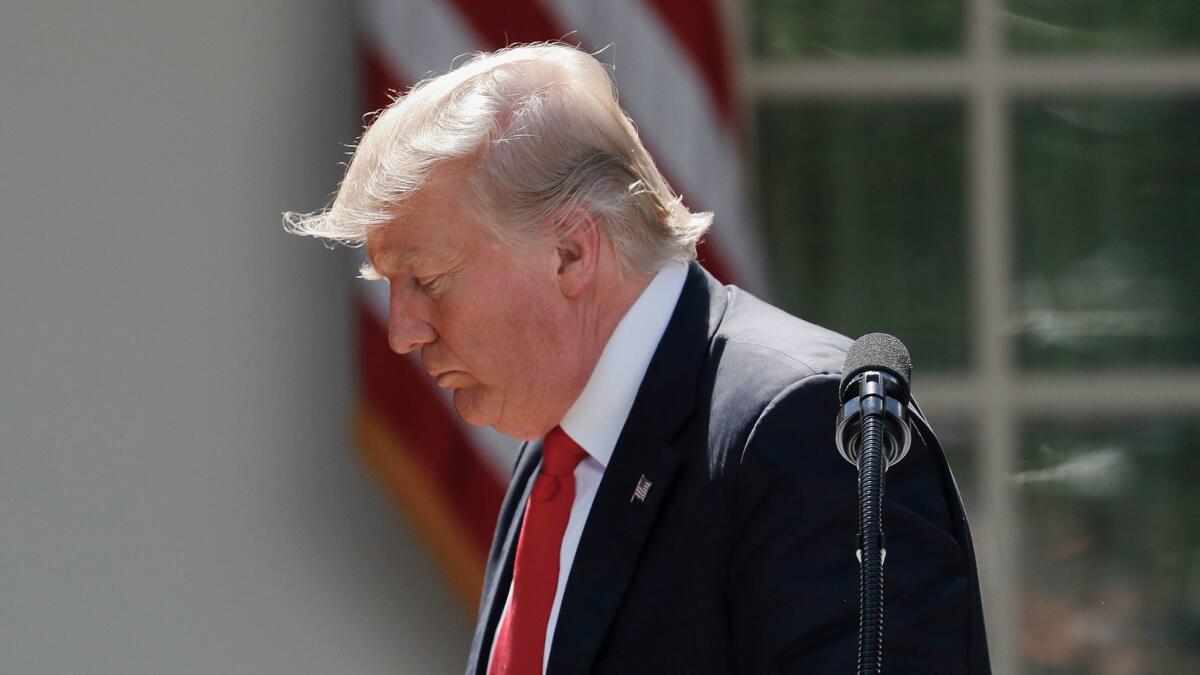Op-Ed: Why did Trump withdraw from Paris? To appease his base

Why did President Trump decide to withdraw from the 2015 Paris climate agreement? It is, after all, a nonbinding accord dependent on voluntary commitments to reduce greenhouse emissions. President Obama pledged fairly aggressive action by the U.S., including significant reductions in emissions from power plants that run on fossil fuels. But it would be easy to undo his proposed cutbacks without leaving the Paris agreement. In fact Trump has already done that. In March, he signed an executive order “aimed,” in CNBC’s words, “at rolling back a number of Obama-era climate policies.”
This action sparked criticism from environmentalists, but was not big news to the world at large. So why provoke a global firestorm of criticism? Why join Syria and Nicaragua as the only nations to renounce the Paris agreement? For Trump, the criticism is precisely the point. It’s an easy way for him to signal to his base that he is implementing his campaign rhetoric of “nationalism” over “globalism.”
It’s the same reason he pulled out of the Trans-Pacific Partnership, a proposed free trade zone among 12 Pacific nations. And the reason he almost pulled out of NAFTA before reluctantly promising to renegotiate it. And why on his recent jaunt to Europe he refused to affirm Article V, the mutual defense provision of NATO.
Trump, married three times, is allergic to binding commitments. He has always been “me first” in his private life — his foundation notoriously invested in Trump portraits, not in actual charitable works — and predictably his foreign policy is “America First.” Give Trump points for consistency: It turns out he has not been tamed by the “grown-ups” in his administration, such as chief economic advisor Gary Cohn, national security advisor H.R. McMaster, and Secretary of Defense James N. Mattis. But in pursuing a radical, quasi-isolationist foreign policy, he is putting America’s true interests last.
Trump, married three times, is allergic to binding commitments.
The U.S. does not benefit when the law of the jungle prevails, as it did in 1914 and 1939. The U.S. has experienced an unprecedented period of peace and prosperity in the post-World War II era precisely because the Greatest Generation, having paid the cost of post-1918 isolationism, chose to pursue a more magnanimous vision of American power.
Rather than trying to impoverish our onetime adversaries, we rebuilt Germany, Italy and Japan as economic powerhouses closely allied with the United States. Rather than going it alone, we built up a whole network of international institutions — the United Nations, the International Monetary Fund, the World Bank, the General Agreement on Tariffs and Trade (now the World Trade Organization), NATO and other, shorter-lived security organizations such as SEATO and the Baghdad Pact — designed to promote the rule of law around the world.
The United States’ critics were always suspicious of this institution-building, because they saw it as a cover for American hegemony, and they were in large measure right. But it was a benevolent hegemony that benefited both the U.S. and our allies without threatening anyone who did not already threaten us.
This is the reason no international coalition arose to resist American power as one did to resist every previous would-be hegemon from Philip II’s Spain and Napoleon’s France to Hitler’s Germany and Stalin’s Soviet Union. There has always been plenty of anti-Americanism around the world, but at the end of the day most nations understood that an alliance with the United States would enhance, not diminish, their peace and prosperity. We did not always implement our ideals — hypocrisy is the coin of the realm in international affairs — but the secret of our success was that we were a relatively benign superpower that championed a vision of human dignity that appealed to ordinary people everywhere.
Trump seems oblivious to this reality. He sees every international treaty as a racket and every alliance as a ripoff. But by destroying the foundations of the international order that the U.S. built, he risks destroying the unprecedented power and wealth we have accumulated since 1945.
If the U.S. pursues a “me first” policy, then every country in the world will do the same — and the result will be international lawlessness. Predatory states such as Iran, Russia and China will do well in the resulting chaos, while our allies — if we have any left — will suffer. If history is any guide, the U.S. will not be able to stay aloof from the consequences of this new disorder: Our trade and security will be imperiled. Ultimately we are likely to be drawn into conflicts that could have been avoided had we maintained our position as Leader of the Free World, a hard-won achievement that Trump appears intent on frittering away with his characteristic recklessness and thoughtlessness.
Max Boot, a contributing writer to Opinion, is a senior fellow at the Council on Foreign Relations.
Follow the Opinion section on Twitter @latimesopinion or Facebook
More to Read
A cure for the common opinion
Get thought-provoking perspectives with our weekly newsletter.
You may occasionally receive promotional content from the Los Angeles Times.










